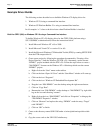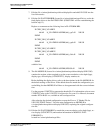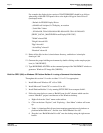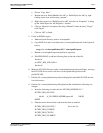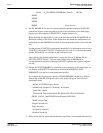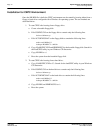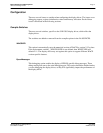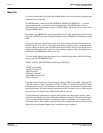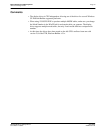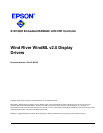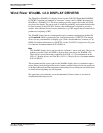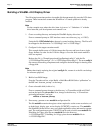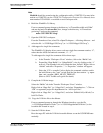
Page 12
Epson Research and Development
Vancouver Design Center
S1D13505 Windows® CE 2.x Display Drivers
X23A-E-001-06 Issue Date: 01/05/25
Mode File
A second variable which will affect the finished display driver is the register configurations
contained in the mode file.
The MODE tables (contained in files MODE0.H, MODE1.H, MODE2.H . . .) contain
register information to control the desired display mode. The MODE tables must be
generated by the configuration program 13505CFG.EXE. The display driver comes with
example MODE tables.
By default, only MODE0.H is used by the display driver. New mode tables can be created
using the 13505CFG program. Edit the #include section of MODE.H to add the new mode
table.
If you only support a single display mode, you do not need to add any information to the
WinCE registry. If, however, you support more that one display mode, you should create
registry values (see below) that will establish the initial display mode. If your display driver
contains multiple mode tables, and if you do not add any registry values, the display driver
will default to the first mode table in your list.
To select which display mode the display driver should use upon boot, add the following
lines to your PLATFORM.REG file:
[HKEY_LOCAL_MACHINE\Drivers\Display\S1D13505]
“Width”=dword:280
“Height”=dword:1E0
“Bpp”=dword:8
“Rotation”=dword:0
“RefreshRate”=dword:3C
“Flags”=dword:2
Note that all dword values are in hexadecimal, therefore 280h = 640, 1E0h = 480, and 3Ch
= 60. The value for “Flags” should be 1 (LCD), 2 (CRT), or 3 (both LCD and CRT). When
the display driver starts, it will read these values in the registry and attempt to match a mode
table against them. All values must be present and valid for a match to occur, otherwise the
display driver will default to the FIRST mode table in your list.
A WinCE desktop application (or control panel applet) can change these registry values,
and the display driver will select a different mode upon warmboot. This allows the display
driver to support different display configurations and/or orientations. An example appli-
cation that controls these registry values will be made available upon the next release of the
display driver; preliminary alpha code is available by special request.



